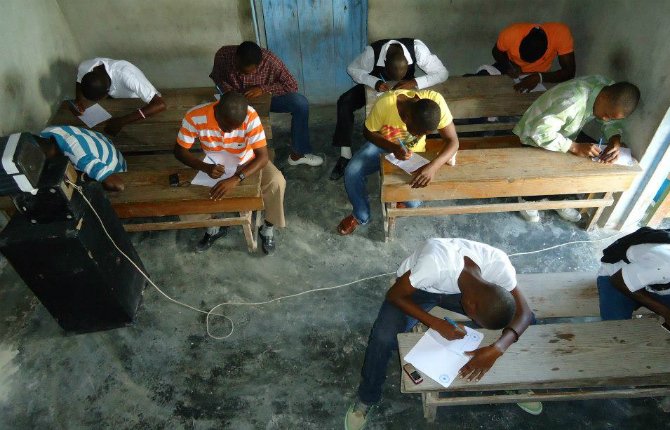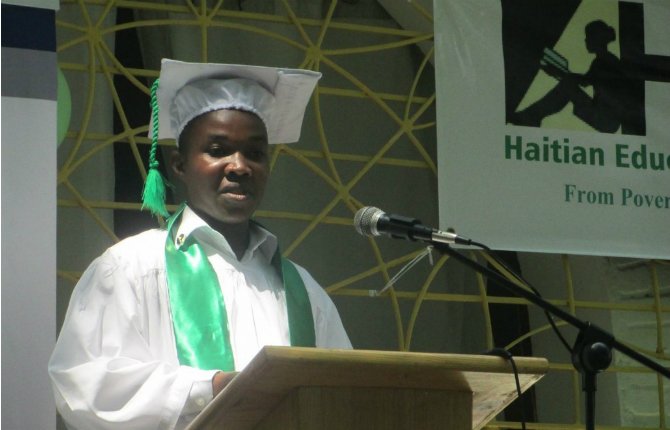Elice Oreste grew up in a remote, mountainous region of Haiti called Labiche. When he was born, Labiche had no roads, no utilities and no schools. Few in his community, including his parents, had ever been to school. Luckily for Elice, a local resident who had been educated, came back to the area and started a primary school. The first year, it had one room, the second year, two rooms, and so on. Elice’s mother said that since she had never spent a single day in school, when Elice started school she could only give him a pencil, a notebook and a prayer.
Elice lived with his parents and four siblings in a two room house; they got by on the revenues from his parents small plot of land but things were always tight in Labiche so people made do with what they had. Elice developed an early interest in music, and at the age of 12 he built his first guitar from scrap wood.
Luckily for Elice, just as he graduated at the top of his class in primary school, the government built the region’s first-ever secondary school in neighboring Grigri. However, it was a two hour walk from his house, each way. Elice did that walk every school day for five years and still finished high school with a straight-A average.

But university was out of the question. Not only had no one in Labiche ever been to university, Elice’s family could barely afford to pay for the seven hour bus ride to the capital, let alone books or housing or tuition. So he apprenticed himself to a local carpenter at a monthly salary of $50. Elice’s life was pretty much set. He would apprentice at the same salary until he was ready to go out on his own and maybe end up making $200 a month.
One day HELP (Haitian Education & Leadership Program) showed up at the high school in Gris Gris, offering university scholarships for straight-A students. The Principal said he didn’t have any that year but he told them about Elice who had just graduated the year prior, and we left an application. Thankfully, Elice got the application and that September he began an industrial engineering degree at Haiti’s oldest private university. At school he was consistently on the Dean’s List and when he graduated in 2014, he secured a summer internship with an energy company in Green Bay, Wisconsin. On his return to Haiti Elice found a job as junior maintenance engineer at the local Heineken brewery at a starting salary of $18,000 a year – 30 times what he had made as an apprentice.

Despite his success, Elice remains attached to his humble roots and committed to improving his hometown. He returns often to Labiche where he has transformed a musical group he started with some friends into a educational and charitable group which awards prizes for the top local students and distributes food to the most needy, who Elice describes as “those that haven’t eaten in two or three days.”
When Elice talks about his story he says, “It sounds like a miracle, but it isn’t. It’s real. And we are only just beginning. We are going to change Labiche, and we are going to change Haiti.”
Call to Action!
HELP is losing more than 30 scholarships from institutional funders this year. Despite a record 291 straight-A applicants, they can only admit 20 freshmen next month, their smallest class in five years. It will also be the first time in HELP’s history that student enrollment will shrink from one year to the next. With 160 students, HELP is still strong but they would like to be stronger to provide opportunity to an increasing number of students.
Help make a difference by donating and sharing this post with your friends and family!
This article was written by Conor Bohan. HELP Founder & Executive Director, he has lived and worked in Haiti from 1996 to 2008. Under his leadership, HELP has grown from a single student to the largest university scholarship program in Haiti. In addition to growing HELP, he was a volunteer teacher, Deputy Director of the National Democratic Institute (NDI) in Haiti, and Director of Haiti Programs for the American Institutes for Research (AIR). Conor has a B.A. in History from Brown University and was named one of the Hemisphere’s Innovators by Americas Quarterly Magazine and is a recent Ashoka Fellow.